| Srl | Item |
| 1 |
ID:
099914
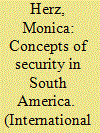

|
|
|
|
|
| Publication |
2010.
|
| Summary/Abstract |
The article analyses the framing of themes and issues in terms of security in South America and the potential support for intervention in the region. The argument is developed that five elements contribute to understanding attitudes toward intervention in the region: the wider interest in the security sphere among South American elites as the Cold War drew to an end; the concern with the distribution of power in the international system; the portrayal of South America as a zone of peace; the broadening of the concept of security; and the centrality of the concept of state sovereignty.
|
|
|
|
|
|
|
|
|
|
|
|
|
|
|
|
| 2 |
ID:
099922
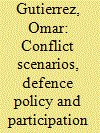

|
|
|
|
|
| Publication |
2010.
|
| Summary/Abstract |
This essay addresses the most relevant milestones of Chile's contribution to international peace operations (PKOs) by exploring its different phases. Its aim is to analyse the interaction between defence policy and foreign policy in the framework of a complex and interdependent international system. This is followed by a description of national regulations for the participation of military personnel in PKOs. Finally, the text analyses the effects of participation in PKOs on Chilean Marine Corps personnel through the results of a perception survey taken in 2009; further it develops potential scenarios for future missions.
|
|
|
|
|
|
|
|
|
|
|
|
|
|
|
|
| 3 |
ID:
099915
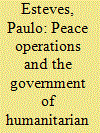

|
|
|
|
|
| Publication |
2010.
|
| Summary/Abstract |
The article identifies how the nexus between democracy, security, humanitarianism and development was built up from the 1990s. It analyses how the discourse of post-conflict peacebuilding has emerged as a notable component of a liberal democratic international order. The article argues that the transformations in peacekeeping operations depend upon a specific spatiotemporal combination - a cleavage between a global and a humanitarian space and the temporality of development. For South American countries, participation in peacekeeping operations became a way to assert themselves as participants of a liberal democratic international order and a reflexive mode to strengthen the process of transformation of their own societies in order to be integrated into a new global cartography.
|
|
|
|
|
|
|
|
|
|
|
|
|
|
|
|
| 4 |
ID:
099916
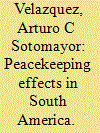

|
|
|
|
|
| Publication |
2010.
|
| Summary/Abstract |
Participation in UN peace operations has increased differences in civil-military relations in South America. Argentina, Brazil and Uruguay have internalized and implemented divergent defence policies, even as they have increased their troop contributions and been involved in similar or identical peacekeeping missions. This is caused not only by the fact that these countries have very different motivations for participating in peace operations; they have also drawn very different lessons from their exposure to peacekeeping.
|
|
|
|
|
|
|
|
|
|
|
|
|
|
|
|
| 5 |
ID:
099919


|
|
|
|
|
| Publication |
2010.
|
| Summary/Abstract |
This article contends that the combined efforts of the ministries of foreign affairs and defence in nine countries of South and Central America, the G9, can be considered a nascent but not yet developed security community. Due to a growing capacity for crisis management which includes the search for political solutions to structural conflict and to political, economic and social deficits in Haiti, the article demonstrates that South American countries are developing a novel concept for post-conflict response. Finally, in the context of democratization, Argentina's participation in peace missions generates domestic elements strongly committed to peace operations.
|
|
|
|
|
|
|
|
|
|
|
|
|
|
|
|
| 6 |
ID:
099921
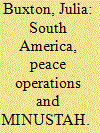

|
|
|
|
|
| Publication |
2010.
|
| Summary/Abstract |
This article explores the opposition to the UN Stabilization Mission in Haiti (MINUSTAH) articulated by the government of Venezuelan President Hugo Chavez Frias and the broader Bolivarian critique of militarized intervention and the liberal peacebuilding agenda. It argues that the structural drivers of South and Central America's embrace of peace operations were fundamentally absent in Venezuela, placing the country on the outside of regional peacekeeping initiatives building up to and including MINUSTAH. The article addresses Venezuelan efforts to craft an alternative peace and security agenda, concluding that there are significant fiscal and institutional challenges to this being realized.
|
|
|
|
|
|
|
|
|
|
|
|
|
|
|
|
| 7 |
ID:
099917


|
|
|
|
|
| Publication |
2010.
|
| Summary/Abstract |
This article assesses the utility of the notion of emerging powers in analysing key characteristics of Brazil's past and present policy towards peace operations. After decoupling emerging powers analytically from traditional middle powers, it addresses a series of political and behavioural factors specific to South America. Finally, the analysis identifies those elements derived from Brazil's emerging power status and South American identity that are of relevance in shaping the country's attitudes towards peace operations generally, and more specifically its participation in the United Nations Stabilization Mission in Haiti (MINUSTAH). It reaches the conclusion that Brazil has acted as a model emerging power - in typically South American Fashion.
|
|
|
|
|
|
|
|
|
|
|
|
|
|
|
|